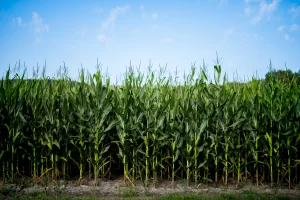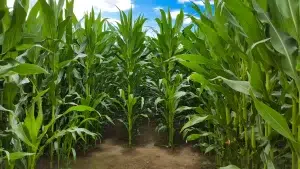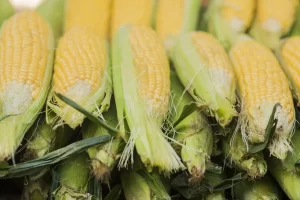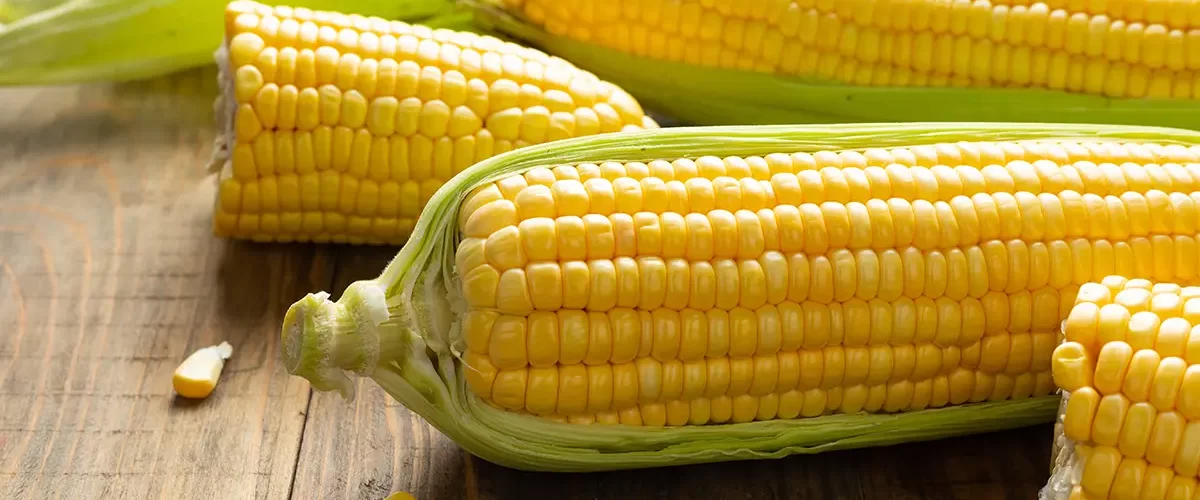No products in the cart.
Applying fertilizers in proper manner and time is crucial. The farmer suffers losses and a decrease in corn yield as a result of improper fertilizer use. Loss of nutrients or fertilizer waste can harm corn crops. The best corn fertilization strategy to boost yield will be covered in more detail below. Please continue reading this article.
One of the key ways to lessen the use of chemical fertilizers is to identify the stage of plant development at which the maximum response to the presence of a food element is seen.
At various growth stages, corn plants need different amounts of nutrients. When fertilizer is applied, the corn plant will receive the nutrients it requires. When you fertilize your corn will affect your yield. Utilizing fertilizer at the right time will increase corn yield, lessen nutrient loss, and prevent environmental harm.

The best corn fertilization program
Corn-based liquid poultry manure
The use of chicken manure and the resulting biochar at the level of 1% of the field soil can increase the height of the plant and the dry weight of the corn shoots and roots in situations of salinity stress in calcareous soil. The aforementioned biochar concentration has no appreciable impact on these variables.
The best urea fertilization program for corn
The method of urea fertilization, whether from the middle of the furrow or strip on one side of the plant or on both sides, has no discernible impact on the plant’s height, the height of the cob, or the proportion of cob wood. In a study, 3 kilograms of fertilizer applied as strips to one side of a corn plant had little effect compared to 90 kilograms of strips applied to both sides.
Additionally, urea fertilizer causes 94% more leaching in corn than urea with a sulfur coating. Given the significance of nitrogen in agriculture, not only is corn lacking in nitrogen, but a significant amount of nitrogen is also leached into the groundwater, which poses serious health risks to consumers if it is used for drinking.
Use of biological nano-fertilizers for corn
The use of Azotobacter can also speed up product growth and net absorption at all levels of chemical nitrogen use in the soil. The use of Pseudomonas fluorescens and Azotobacter results in an increase in corn kernel yield, harvest index, biomass, and the number of corn kernels per row. It also results in a decrease in the weight of 1000 corn kernels.
Total sugar, glucose, fructose, auxin, gibberellin, and cytokinin are all increased by the use of vermicompost and azotobacter in the soil. The percentage of corn protein yield can be affected by nano biological fertilizer at a rate of 2 kilos per hectare, which is equivalent to 20 tons of cow manure per hectare.
The best time to use potash fertilizer for corn
Corn yield is increased more effectively when potassium sulfate and biological fertilizers that promote growth are used simultaneously. Therefore, it is advised to use both at the same time in order to achieve optimal results according to the soil test and balance the level of potassium in the soil.
Water or soil bicarbonate can lower the potassium content of corn roots and shoots, but it can also have an impact on sweet corn’s biological processes and grain production. At a concentration of 30 mg/liter, this substance begins to have beneficial effects; higher concentrations have the opposite effect.
The effect of biological fertilizers on the yield and quality of corn seeds
For the best crop, plants require the proper amount of phosphorus from the very beginning of their growth. However, using chemical fertilizers excessively pollutes the environment. As a result, the use of biofertilizers as a substitute for chemical phosphate fertilizers is a hot topic right now.
According to studies, the genotype and variety of plant determine the success rate of using biofertilizer, and the response rates of various cultivars to biofertilizer can vary. However, biofertilizers can be used as a suitable substitute for chemical fertilizers in corn fields in order to cut costs and environmental pollution.
Sugar factory waste as corn soil conditioner
It is possible to use waste from sugar factories as a soil conditioner and to partially replace chemical fertilizer to lower consumption. The use of sugar factory waste in the amount of 30 tons per hectare significantly increases the amount of phosphorus that plants can absorb, and nearly doubles the amount of nitrogen in the soil. Additionally, it significantly increases the amount of organic matter in the soil even when soil salinization is not a factor.
The effect of foliar application of rosin oxide and silica on corn yield
The growth and yield of corn can be significantly increased by applying foliar sprays of nano-zinc oxide and nano-silicon oxide together rather than separately. As opposed to conventional fertilizers, however, the use of zinc and silica nano-fertilizers increases corn grain yield. Different effects on the concentration of iron, zinc, and copper can be seen depending on the bicarbonate concentration.

The effect of silicone fertilizer on the quality yield of corn
Iron deficiency is a common disorder in calcareous soils that affects a wide variety of plants in arid and semi-arid areas. Corn plants grow more quickly and experience less biotic and abiotic stress thanks to silicon. In corn, an iron deficiency causes an increase in malondialdehyde and free proline and a decrease in chlorophyll, carotenes, and protein.
Iron deficiency is restored and its effects are lessened in corn plants when silicon is present. 1.5 mM of silicon can be obtained from sodium silicate as a source. The amount of corn seed protein can be increased by foliar spraying with 1.5 mM silicon. Due to its rapid growth, the corn plant has a high nutritional requirement. Corn’s yield and growth characteristics are significantly improved by the application of mycorrhiza and 50% triple superphosphate at the 6-leaf stage, as well as nano-iron fertilizer at a rate of 2 grams per liter.
Studies have shown that iron application in the form of iron sulfate on Single Cross 704 corn can partially increase the plant and the number of seeds in the cob, even though iron and zinc foliar application in drought stress conditions has no discernible effect on grain corn condition. Enhance corn’s biological performance.
The effect of amount and time of nitrogen fertilizer application on corn grain yield
Some characteristics of fodder, such as the dry weight of corn leaves and dry weight of cobs, increase when nitrogen is added to the corn cultivation process. This flow is positively impacted by the cultivation of cluster flower vetch as the first crop as well as green manure and soil nitrogen supplier. The amount of nitrate leaching is significant from an environmental standpoint in addition to its impact on corn yield and improvement of water and fertilizer efficiency. Less washing is required the less irrigation and fertilizer are used.
Researchers think it is possible to predict the crop yield by estimating the amount of nitrogen in the soil and its characteristics during the growing season. According to this field’s research, the highest levels of microbial respiration are found during the growing season in soils treated with nitroxin biological fertilizer, followed by organic fertilizer. Since the soil’s electrical conductivity and the nitrogen cycle operate in opposition to one another, it is possible to estimate the amount of nitrogen present in a given area of soil by measuring the electrical conductivity.
The effect of nano-fertilizers on corn yield and yield components
Studies have shown that foliar spraying of silver nanoparticles on corn can affect biological performance and grain yield even when iron and zinc fertilizers are used. At a concentration of 30 mg/liter, this substance has been shown to have positive effects; higher concentrations have the opposite effect.
The growth and yield of corn can be significantly increased by applying foliar sprays of nano-zinc oxide and nano-silicon oxide together rather than separately. In contrast, using zinc and silica nano-fertilizers is more effective than using conventional fertilizers at increasing corn grain yield. Contact our experts to learn more about our corn fertilization program to boost product yield.

